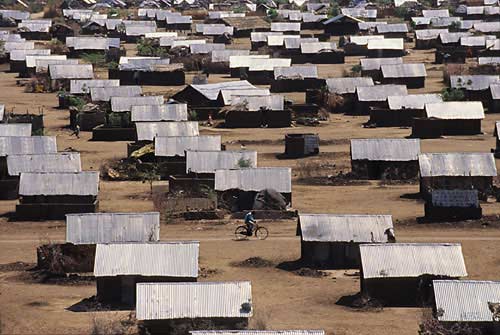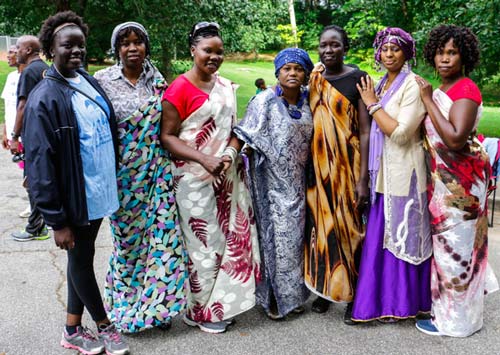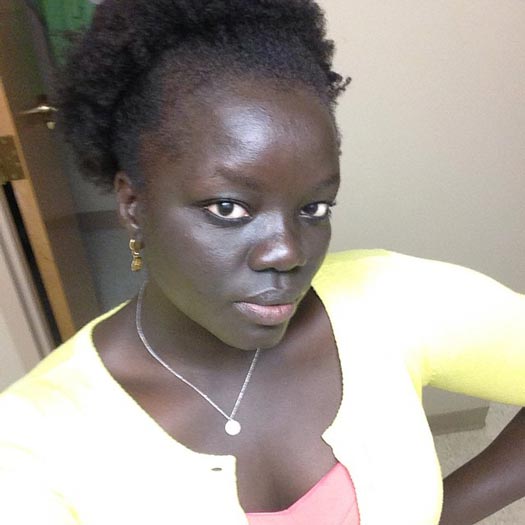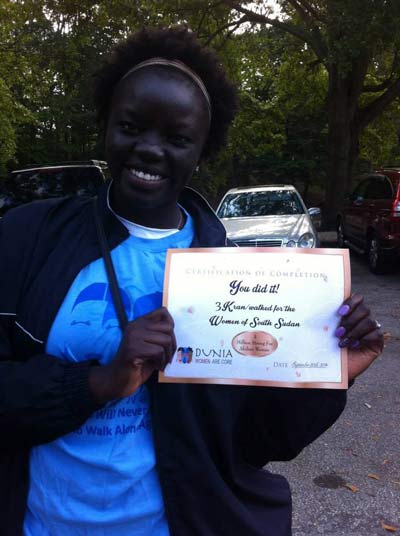We are each remarkable for different reasons – it could be because of what we stand for, or sometimes due to great achievements, or simply because of what we have been through. The young lady you are about to meet happens to personify all three of the above aspects of greatness — and more.
We first met her when she flew to Atlanta this past September to participate in the 3K Run/Walk for the women of her home country South Sudan organized by Women Are Core & DUNIA Magazine; Adeng was a speaker at the event.
Having arrived in the United States at the tender age of 9, she is now a 23 year old charismatic young lady on a mission — an honorable mission of speaking out and helping make life easier for girls in her home country.
Interestingly, she is one of the ‘Lost Children of South Sudan’ – a group of children (mostly orphaned or child soldiers) who fled the horrors of war in South Sudan to other countries. Of the thousands of refugee children flown to the United States for a fresh start some fourteen years ago, 3,800 were boys and only 89 were girls; Adeng is one of the 89 girls.
Over the years there have been discussions, documentaries and even movies made about The Lost Boys of South Sudan, and not nearly as much focus on the girls. So I was immediately drawn to Adeng, wanting to know more about her story. During one of our conversations, I asked Adeng how it feels to have lost both parents and most family members in war, and how she deals with the memories. She said she has learned to live with things as they are and focuses on helping make a difference especially in the lives of young girls such as herself.
In this interview, we go beyond the statistics & sensational headlines about South Sudan a country still in recovery after decades of war, into the minds of one of her citizens – a young lady who exemplifies the African spirit of hope, endurance and inner strength. She is Asunta Adeng Abur.
Who is Adeng Abur in your own words?
Adeng Abur: In my own words, Adeng Abur is a tomboyish young woman fighting to stay in the will of God and fulfill the calling that He has placed on my life.
You are one of the ‘Lost Children of South Sudan’, what does it mean and how does it feel?
Adeng Abur: Being one of the “Lost Girls of South Sudan” to me just means being placed in a once unfamiliar land without my parents and without my culture, but as of now this land has become my second home providing me with amazing opportunities that I did not have before.
Being a “Lost Girl,” in the bigger picture is the best thing that ever happened to me. Let me explain… I say this because God choose me to be born into a family that fought for my freedom and the freedom of all South Sudanese, that they died leaving me in the care of my teenage sisters, and the hardship of the refugee camps of Kakuma. Those were the hard parts but God blessed my two sisters and me to be among the only 89 “Lost Girls” to come to the United States in 2000; that I have to say is a work of God. To be honest being a lost girl was a setup from God because He has greater for me to do in His Kingdom concerning the people of South Sudan.
Have you stayed in touch with other Lost Girls of South Sudan? Where are they now?
Adeng Abur: I have stayed in touch with one of them, who has now become my sister. Tabitha and I were the youngest Lost Girls in Mississippi. When we first met, we fought, but making major news upon arrival in the United States, we decided we were better off sticking together. She was this skinny girl and I was this tomboy. Soon after, we realized we were all we had and that created a very strong bond between us. Tabitha is now married to one of the “Lost Boys” with a toddler and a baby boy on the way. She is what I call super mom – in school and taking amazing care of her husband and son.
Tabitha is the only South Sudanese “Lost Girl” that I have any contact with besides my sisters. Both of my sisters are married with children. My oldest sister Nancy is in North Carolina, she’s a mother of two girls and a newborn son, she is also married to a Lost Boy. My other sister Regina is married with two sons in Taxes, also to a Lost Boy. It seems that the theme of the Lost Girls is to marry a Lost Boy. These three women are the people I look up to the most because they have been through the struggle with me from Kakuma refugee camps to the foster care system of Mississippi.
You have a passion for helping young girls in South Sudan, please tell us more about that.
Adeng Abur: My passion or should I say my “BABY”… the day God blessed with the Holy Ghost according to Acts 2:38 he also impregnated me with a burning passion for my young nation. From a young age I wanted to know who I was, but moving from foster home to foster home, I never identified with the African-American foster families I lived with, so when I was old enough I researched my family and I found them through Facebook and other social media outlets. These discoveries lead to me knowing about South Sudan and I began to look for ways to help. I looked at so much data and so many statistics regarding girls and it just made sense to make that my focus point. I named this focus “God’s House of Destiny”; along with my best friend Tabitha, her friends Yarr and Alakiir and together we brainstormed on how to help the women.
This idea to help women was neglected for a few years due to life in high school and starting college — and you know how things go. While I was going about my business I was leaving behind the most important thing God has given me, my people. God reignited that when I was given the opportunity to attend my dream university after graduating with my associate degree. This past summer I began to live the life I wanted, working on the pads project as if God’s House of Destiny was already established and others took notice and started helping.
My boss is one of those key people and helping me help South Sudanese girls go to school four weeks out of a month by providing them with reusable sanitary napkins. We are in this phase working with the STEM program at Mississippi College and with a local church sewing group to provide 150 girls with four reusable pads each in July 2015.
My passion goes beyond this phase but we have to start somewhere. I have had this dream for a long time and it is now in the birthing phase and I am excited watching God bring the plan together.
What are some challenges you have faced and how have you overcome them?
Adeng Abur: Growing up in the refugee camp brought about many challenges but I have to say the hardest one was being illiterate upon arriving in the United States. Coming to the States I spoke no English and reading it was impossible in my head. I overcame the speaking part by watching lots of cartoons and taking the amazing ESL class taught by Mrs. Kate. The reading part was the one that took me the longest.
Within the first two years of coming to the States, I had been to five foster homes and by my sixth one, I was reading on the first grade level with no hope for any clear future. When I reached my sixth home, I was so discouraged that I just shut completely off from the foster parents and the teachers, but they never gave up. My foster mother held me back that year from going to another grade and that following year, I met the best teacher in the world, Ms. Preached. She realized my potential and she worked with me until I was confident enough. By the time I left 8th grade I was reading on my right level and I had this huge boost of self-confidence and self-awareness.
In life we run into people that we will never forget — and over coming this challenge brought so many amazing people into my life and now I love reading because that is a gift that every South Sudanese child wishes for.
In your opinion, what does South Sudan need most to foster stability and growth?
Adeng Abur: In my opinion, I believe that South Sudan needs a very strong educational system in order for our young nation to grow. Education is the one thing all these powerful nations have in common and if we implement that in South Sudan for girls and boys alike our nation would be powerful. South Sudan needs less money and materialistic things brought our way, and more education on how we can create those materialistic things ourselves so we can better our economy by creating jobs, educational programs, and empowering our people to be self-sufficient nation
— in closing???
Adeng Abur: In closing I would just like to say Glory be to God for creating this amazing connection with you Lema and for this chance to share my joy and a piece of myself. I want to say to anyone that’s reading this that God is more than able to take care of you, He just wants you to look to Him. God wants us to be his family and that’s simply why I want to share that piece of myself because that is the most important thing to me in life. I love knowing that God has my back and he has yours too!
Read | South Sudanese music hit-maker Yaba Angelosi talks creativity, career and hopes for country
PHOTOS

The Kakuma refugee camp in Kenya located close to the border between Sudan and Kenya has hosted close to 140,000 refugees since it was established in 1992

Adeng poses with other ladies at 3K Run/Walk. September 20, 2014
Lema is on Twitter: @LemaAbeng. Website: www.lemaabeng.com



Are you sure about the number of refugees housed in Kakuma since 1992? How can 14,000 be accurate when the capacity of the camp lies far above that? I read somewhere it hold over 100,000 people at a time.